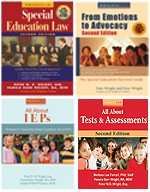What's In Store at Wrightslaw?
![]()
Special Ed Law & Advocacy Training (6.5 hrs)
25% Off the Wrightslaw Bundle of 4 PRINT books for $58.35 (Sorry, coupons not accepted on this product)
Includes Wrightslaw: Special Education Law, 2nd Ed., Wrightslaw: From Emotions to Advocacy, 2nd Ed., Wrightslaw: All About IEPs and Wrightslaw: All About Tests and Assessments, 2nd Ed.
New! The Wrightslaw Bundle is now available as an immediate PDF download. All four Wrightslaw books as PDFs for just $49.95!
![]()
by Robert K. Crabtree
As
informed and articulate as particular parents may be, they usually cannot
make a case for particular services or programs for their child without
the help of a competent and credible independent evaluator. In due process
hearings there is usually no more important witness for the family.
In this light, the most serious mistakes evaluators can make are the ones
that undermine their credibility or which render their opinions powerless
for lack of the evaluator's follow-through.
Here are some serious mistakes independent evaluators should try to avoid:
(1) Failing to assess the student's testing performance in the larger context of his/her educational history, family situation, school setting, psychological make-up and other factors. An evaluation can only provide a snapshot of a student. A report that only describes current test scores explains nothing and provides little foundation for the evaluator's recommendations.
(2) Not contacting the student's teacher(s), special education administrator, or other school personnel involved with the student as key sources of information in the evaluation. Evaluators should not simply assume that the parents' perceptions are more accurate than the school's; sometimes the evaluator's most important role is to reassure parents that their child's public school program is essentially sound.
(3) Writing reports that are poorly organized, full of jargon, carelessly proofread, or in which the recommendations do not connect logically to the testing results; using boilerplate recommendations that are obviously not specifically geared to the student and his/her particular circumstances.
(4) Limiting program and service recommendations only to those the evaluator knows are available in the student's particular school system and/or taking the potential cost of providing recommended services into account. Worse, failing to make any educational recommendations at all on the misguided premise that only school employees can decide how to meet identified needs. Special education law entitles the student to services that will enable him/her to progress educationally. The evaluator's job is to recommend appropriate services, not to limit recommendations to those that are convenient for school systems.
(5) Failing to consider and report on the likely risks for a student if recommendations are not implemented.
(6) Not clarifying for parents that there is often a real difference between recommendations that are clinically desirable and recommendations that are legally mandated (e.g., the best educational program for Johnny may be at a private school catering to his specific needs, but the public school program, which offers less intensive special education services in the "least restrictive" setting may be what the law entitles Johnny to). Not referring parents to a competent special education attorney or advocate to evaluate and advocate for their legal rights.
(7) Refusing to leave the citadel: not following through after the report is written; e.g., not attending team meetings, observing programs, and/or testifying when those activities are necessary to ensure that the evaluator's recommendations will be understood, accepted, and implemented.
(8) Working exclusively as a parents' or as a school system's evaluator; this is a sure way to lose credibility as an evaluator over time.
More "Mistakes People Make" Articles
Mistakes Independent Experts Make. Read what to do to avoid feelings of betrayal and the retaliation that results when independent experts in your corner make mistakes. Read this article by Pete Wright, Esq.
Mistakes People Make: Parents. Because the stakes are so high, it is difficult for parents of children with special educational needs to advocate calmly and objectively for the educational and related services their children need. To learn about mistakes parents make, read this article.
Mistakes People Make: School Districts. What makes parents angry? Parents are angry when school personnel take actions that undermine trust, create a negative climate that destroys peace of mind, and deliver inadequate services to the child. Want to learn more? Read article
Mistakes
People Make: Advocates. Because
the non-lawyer advocate plays an extremely important role in the special
education process, advocates must be mindful of the power of their role
and the trust parents place in them. The more serious mistakes advocates
may make are generally ones of excess . . . Read
article
More Articles by Bob Crabtree
The
Paper Chase: Managing Your Child's Documents. "If you have
kids with special educational needs, you can be overwhelmed with paperwork
in no time at all . . ."
Discipline:
Suspension, Expulsions and IEPs. Read this article by parent attorney
Robert Crabtree to learn about functional behavioral assessments, behavior
intervention plans, long-term suspensions and expulsions, the child's
rights, and what parents can do to protect these rights. Learn how to
request a behavior assessment, an expedited hearing, and how to invoke
"stay put."
Meet
Robert Crabtree
Bob Crabtree is a partner at Kotin,
Crabtree, and Strong, LLP, a general practice law firm in Boston,
MA. Among other areas of practice, Bob concentrates in special education
and disability law. This article was originally published by the Family
Education site at www.familyeducation.com
Contact
Info:
Robert
K. Crabtree
Kotin, Crabtree & Strong, LLP
One Bowdoin Square
Boston, MA 02114-2925
Phone:
617/227-7031
Facsimile: 617/367-2988
Email: rcrabtree@kcslegal.com
Website: www.kcslegal.com
Copyright © 1998-2022, Peter W. D. Wright and Pamela Darr Wright. All rights reserved. Contact Us
